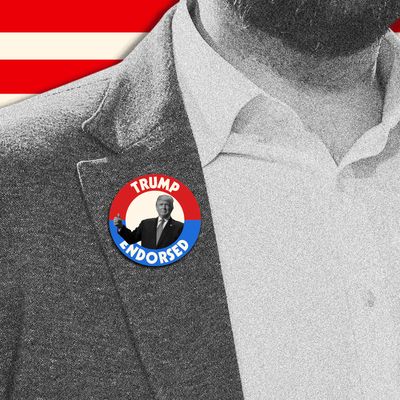
When Donald Trump endorsed J.D. Vance in Ohio’s Senate race on Friday, it ended a long and frenetic dance. Most of the candidates in the Republican primary have been angling for Trump’s approval, and Vance did not appear to possess much of a shot at glory. He has yet to translate his fame as the best-selling author of Hillbilly Elegy to substantive political support. He has trailed Josh Mandel, the former Ohio state treasurer, consistently, and Mandel appeared likeliest to secure a Trump endorsement. Vance had practically contorted himself to get Trump’s attention, linking his mother’s addiction problems to immigration from Mexico in a campaign ad that was bait for Trump as much as it was for voters.
Trump’s endorsement, however, was never guaranteed. Vance has not been a steadfast Trump loyalist. That honor goes to Mandel, whose Trump impression is solid and whose commitment to Trump himself is without question. Vance, meanwhile, praises the ex-president with all the passion of a convert. In the early days of his public career, he was a Trump critic, which further endeared him to liberals. To a blue-state reader, Vance was a dream: an educated conservative they’d actually invite to dinner. Ron Howard even made a movie about his life. What happened?
Vance and Trump always had more in common than the author’s long-ago public statements implied. The proof is in Hillbilly Elegy, a fundamentally conservative, even reactionary work. At a high-school job, Vance writes, he learned “how people game the welfare system.” Customers would “buy two-dozen packs of soda with food stamps and then sell them at a discount for cash,” he asserts. “They’d regularly go through the checkout line speaking on their cell phones. I could never understand why our lives felt like a struggle while those living off of government largesse enjoyed trinkets that I only dreamed about.” The story contains shades of the old Obamaphone conspiracy theory, which said, falsely, that President Obama had provided free cell phones to people on welfare. Never mind that cell phones are tools, not luxuries, and the poor have a right to own them.
Yet Vance continues. He’d note, carefully, how much of his paycheck disappeared into taxes and note, too, that his “drug-addict neighbor” bought “T-bone steaks, which I was too poor to buy for myself but was forced by Uncle Sam to buy for someone else.” He cites Charles Murray positively for addressing “the way our government encouraged social decay through the welfare state.” Murray’s commitment to race science is not remarked upon, and the absence of further context is telling. In Vance’s account, the man is simply an “insightful” social scientist.
The passages should have raised the alarm for any reader who is interested in lifting Americans out of poverty. Scratch lightly at the surface of Hillbilly Elegy and right-wing themes become apparent. Vance’s characterizations of the poor only repackaged myths about welfare queens and the terminal laziness of the disadvantaged. But since Vance branded himself as a graduate of the working-class Appalachian experience, liberals graded his commentary on a sliding scale. His conservatism could be forgiven; his addict mother had abused him into it. Because of his background, he understood populism and could explain it to the bubble dwellers who propelled him to grand heights. He was a rarity, a true self-made man. Vance affirmed America’s innate, meritocratic greatness, which made him a safe and trustworthy figure to many.
Vance is not much of a writer. Hillbilly Elegy is little more than a collection of resentments in book form. Its observations are trite, its conclusions derivative. The same facts form the basis of Vance’s appeal. Vance did not challenge liberals or their perceptions of poor whites. The people who bought his memoir and recommended it to others did not need to be convinced that poor whites were trash with a culture in decay. They already suspected this to be true. For decades, conservatives and neoliberals alike had preached the gospel of personal responsibility as the solution to poverty. Now here was Vance, acting as a kind of native informer to repackage old ideas, to affirm old prejudices. Vance’s real skill is that of a marketer. He is a salesman, and the product he sells is himself.
He shares this trait with Trump. The former president also made himself out to be a self-made success with a finger on the populist pulse. Though this is a fabrication — Trump, recall, inherited millions from his parents — that is the image he projected to the world with an assist from television’s dreaded liberal elites. Trump the man and Trump the brand are the same. There is no level to which he will not sink in the name of personal profit. He understands that his political future depends on his ability to keep up an act that appeals to his followers. So, too, does Vance. In fact, Vance has always known this. He played the respectable conservative for as long as it benefited him to do so, and when the winds shifted, so did he.
Vance’s pivot is not so dramatic. It is no great reversal. He rose to fame on a tale of white culture in crisis and moved further rightward along with the rest of the GOP after Trump gave them permission to do so. Trump has now rewarded him for his dedication. If that shocks liberals, they can ask themselves what they once found so compelling about Vance and Hillbilly Elegy. J.D. Vance is who he’s always been. The signs were present from the start.






























